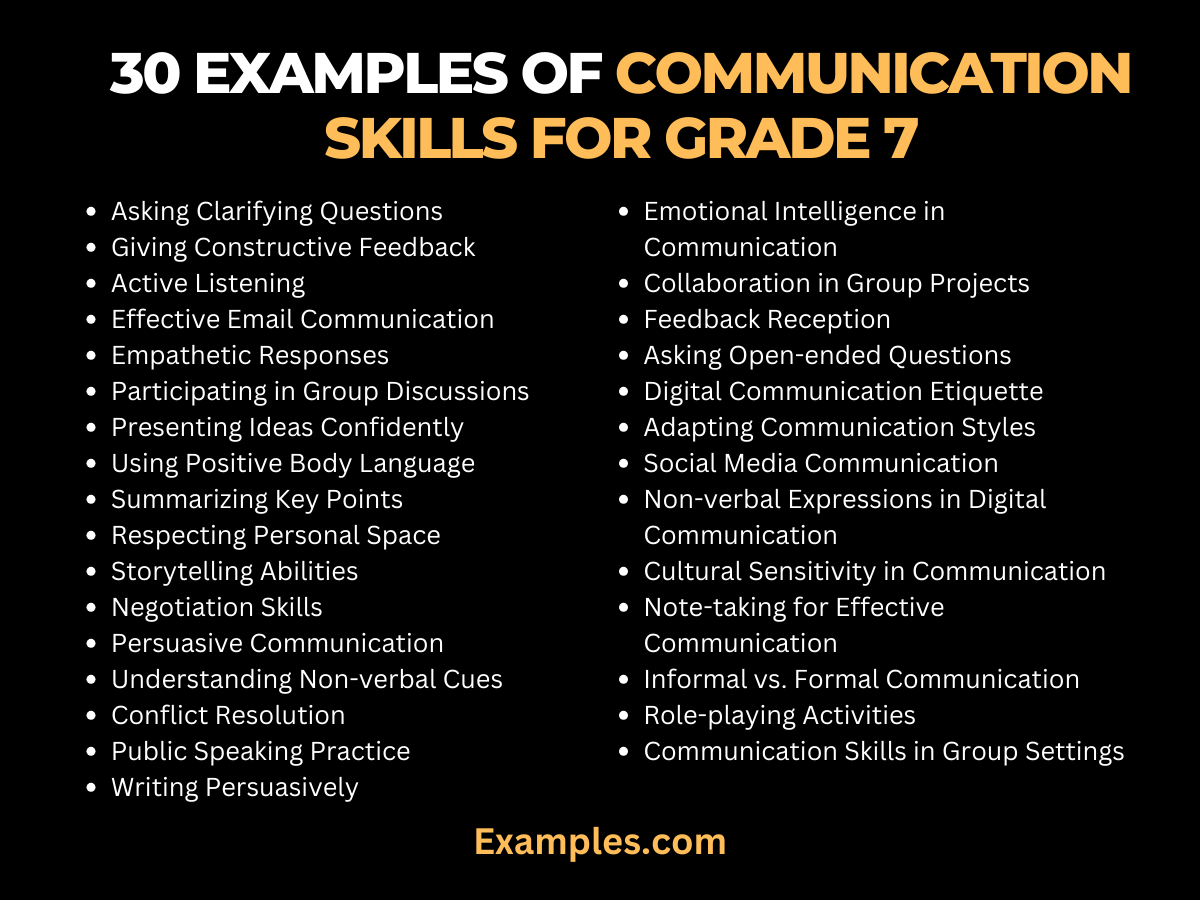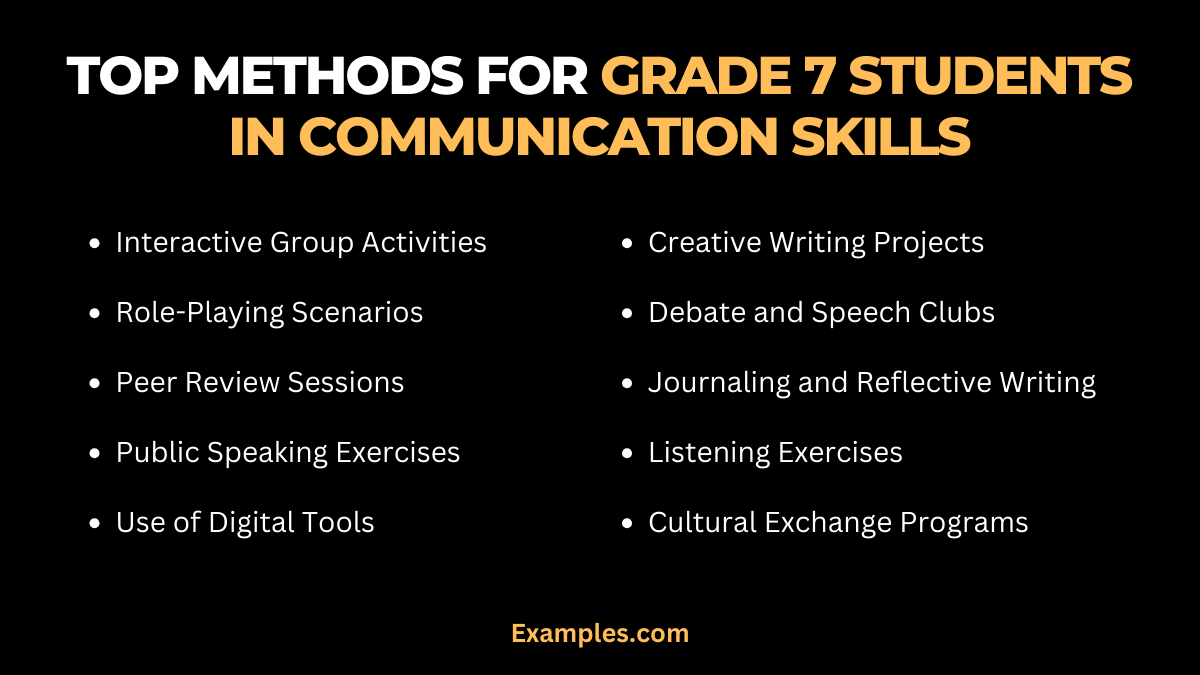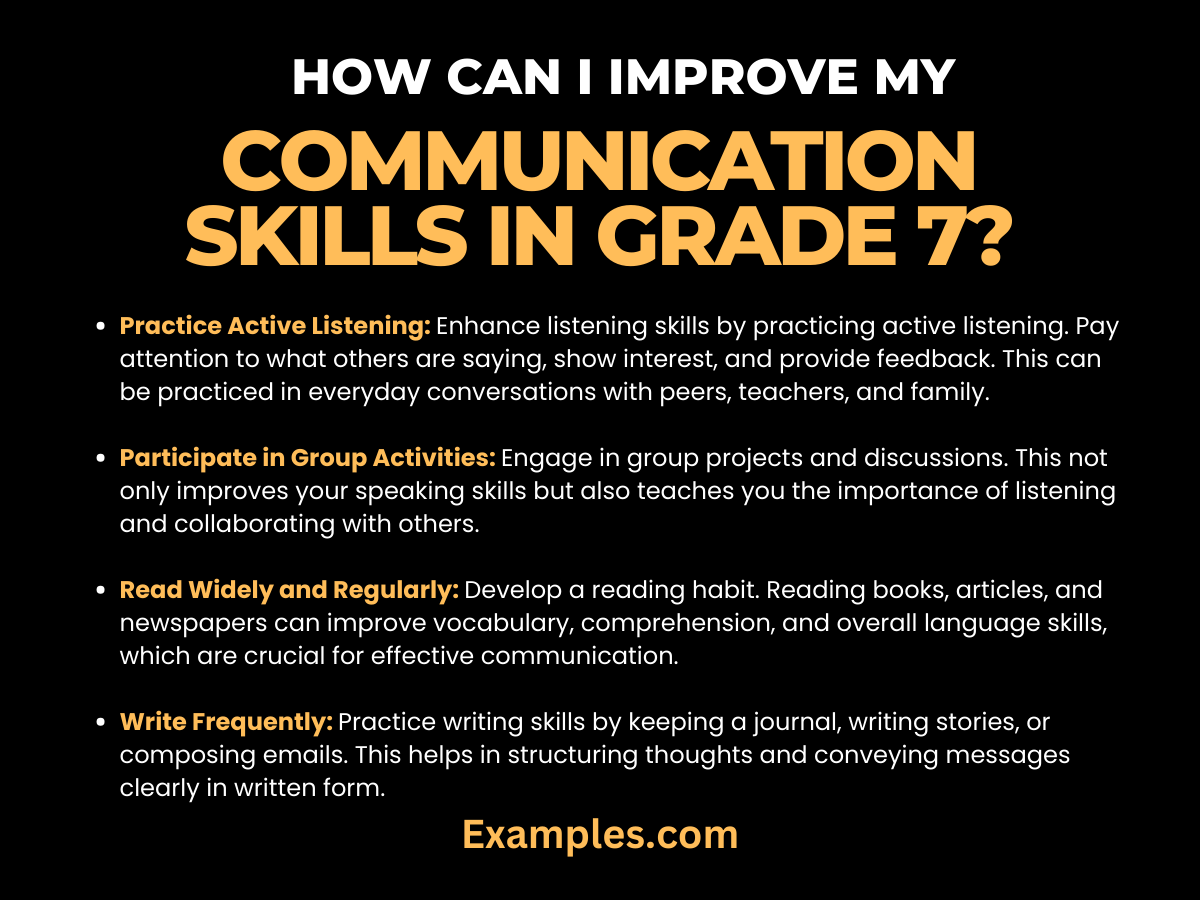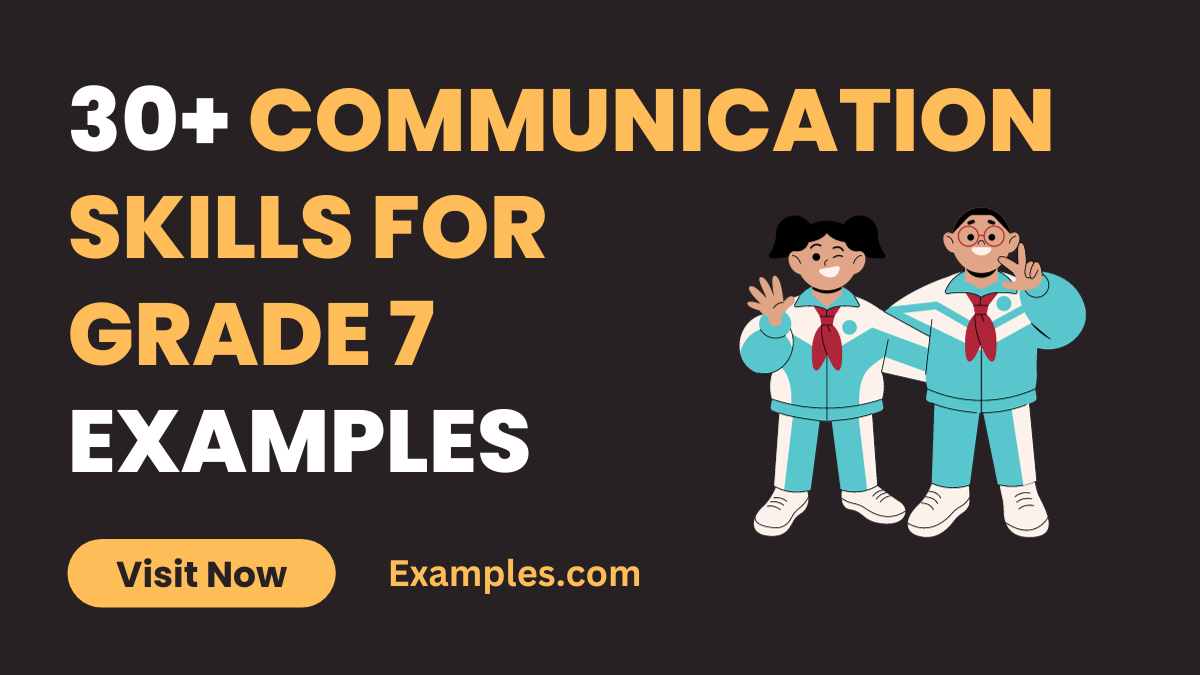Communication Skills for Grade 7
Developing communication skills in Grade 7 is a pivotal step in a student’s academic and social journey. This comprehensive guide offers a rich array of practical communication examples tailored for seventh graders. It covers essential aspects like verbal and non-verbal communication, active listening, and empathetic interaction. These examples, woven into everyday classroom and social scenarios, provide valuable insights for students to enhance their communication abilities. Whether for presentations, group projects, or everyday conversations, this guide serves as a fundamental resource for Grade 7 students to refine their communication skills effectively.
30 Examples of Communication Skills for Grade 7
Discover the art of effective communication with our tailored guide for Grade 7 students. This comprehensive list offers 30 unique and practical examples, each accompanied by a brief explanation and demonstration of how to apply these skills in real-world scenarios. Enhance your verbal, non-verbal, and digital communication abilities with these insightful and engaging examples, ideal for young adolescents embarking on their journey to becoming proficient communicators.

- Asking Clarifying Questions: Develop the skill of seeking clarity in conversations by asking specific questions to understand better.
Example: “Could you please explain what you mean by that?” - Giving Constructive Feedback: Learn to provide feedback that helps improve performance while maintaining a positive tone.
Example: “I liked how you presented your idea, maybe next time you could add some examples.” - Active Listening: Focus on listening attentively and showing understanding through body language and paraphrasing.
Example: Nodding and saying, “So, what you’re saying is…” - Effective Email Communication: Practice crafting clear and respectful emails, suitable for school or informal communication.
Example: Begin with a greeting, state your purpose, and end with a polite closing. - Empathetic Responses: Show empathy by acknowledging others’ feelings and perspectives.
Example: “I understand that must have been challenging for you.” - Participating in Group Discussions: Contribute to group conversations by sharing thoughts and respecting differing opinions.
Example: “I see your point, and I also think that…” - Presenting Ideas Confidently: Practice speaking clearly and confidently to convey ideas effectively.
Example: Stand tall, make eye contact, and articulate your thoughts coherently. - Using Positive Body Language: Communicate non-verbally with gestures and expressions that convey a positive attitude.
Example: Smiling and nodding to show agreement or interest. - Summarizing Key Points: Develop the ability to concisely summarize main ideas in a conversation or text.
Example: “To sum up, the main points discussed were…” - Respecting Personal Space: Understand and respect others’ physical boundaries during communication.
Example: Maintaining a comfortable distance while conversing. - Storytelling Abilities: Use storytelling to make your communication more engaging and memorable.
Example: Share a relevant personal story to illustrate a point. - Negotiation Skills: Learn to find mutually beneficial solutions in discussions or conflicts.
Example: “What if we compromise by…” - Persuasive Communication: Practice persuading others respectfully and effectively.
Example: Present logical arguments and benefits to persuade your audience. - Understanding Non-verbal Cues: Pay attention to and interpret body language and facial expressions.
Example: Recognizing a furrowed brow as confusion or concern. - Conflict Resolution: Resolve disagreements with calm and constructive dialogue.
Example: “Let’s find a solution that works for both of us.” - Public Speaking Practice: Build confidence in speaking in front of groups, large or small.
Example: Practice a speech or presentation in a safe environment. - Writing Persuasively: Learn to express ideas effectively in written form, particularly in essays or letters.
Example: Use compelling language and strong evidence in writing. - Emotional Intelligence in Communication: Be aware of your own and others’ emotions during interactions.
Example: “I sense that this topic is important to you.” - Collaboration in Group Projects: Work effectively with others, sharing ideas and responsibilities.
Example: “Let’s divide the tasks according to our strengths.” - Feedback Reception: Develop the ability to accept and utilize feedback for personal growth.
Example: “Thank you for the feedback, I’ll work on that.” - Asking Open-ended Questions: Encourage deeper conversation by asking questions that require more than a yes/no answer.
Example: “What are your thoughts on this topic?” - Digital Communication Etiquette: Understand the norms and etiquette of communicating via digital platforms.
Example: Using polite language and appropriate emoticons in texts. - Adapting Communication Styles: Adjust your communication approach based on the audience and context. Example: Using formal language with teachers and informal with friends.
- Social Media Communication: Navigate the nuances of communicating effectively on social media platforms.
Example: Posting respectful and thoughtful comments online. - Non-verbal Expressions in Digital Communication: Use emojis and gifs appropriately to express emotions in digital conversations.
Example: Sending a smiley face to convey happiness. - Cultural Sensitivity in Communication: Be aware and respectful of different cultural communication styles.
Example: Being mindful of cultural differences in expressions or gestures. - Note-taking for Effective Communication: Develop the habit of jotting down important points during lectures or meetings.
Example: Use bullet points to summarize key information. - Informal vs. Formal Communication: Recognize the differences and appropriately switch between informal and formal communication styles.
Example: Using slang with friends but formal language in academic settings. - Role-playing Activities: Engage in role-play to practice various communication scenarios.
Example: Acting out a job interview to practice professional communication. - Communication Skills in Group Settings: Learn to communicate effectively in team environments, respecting and valuing each member’s input.
Example: “Let’s hear everyone’s ideas on this.”
Top Methods for Grade 7 Students in Communication Skills
Developing communication skills in Grade 7 students requires effective and engaging methods. This guide outlines top methods that educators and parents can use to enhance the communication abilities of seventh graders. These methods focus on practical and interactive approaches, such as group activities, role-playing, and technology integration, making the learning process both effective and enjoyable.

- Interactive Group Activities: Engaging students in activities that require teamwork and communication.
- Role-Playing Scenarios: Practicing various communication scenarios through role-playing.
- Peer Review Sessions: Exchanging and reviewing work among peers to develop constructive criticism skills.
- Public Speaking Exercises: Regular practice in speaking in front of groups to build confidence and clarity.
- Use of Digital Tools: Incorporating technology to practice communication skills, such as creating videos or podcasts.
- Creative Writing Projects: Encouraging writing as a form of self-expression and communication.
- Debate and Speech Clubs: Participation in extracurricular activities that focus on developing speaking skills.
- Journaling and Reflective Writing: Maintaining journals to reflect on personal communication experiences and growth.
- Listening Exercises: Activities focused on developing active listening skills.
- Cultural Exchange Programs: Participating in activities that expose students to diverse communication styles and cultures.
Effective Communication Skills for Grade 7
Effective communication skills are crucial for Grade 7 students as they navigate more complex academic and social landscapes. This segment offers insightful examples that demonstrate effective communication strategies suitable for seventh graders. These skills include clear articulation, active listening, appropriate non-verbal cues, and empathy. Understanding and applying these skills can significantly enhance students’ interactions and academic performance, preparing them for future challenges.
- Articulating Ideas in Class Discussions: Expressing thoughts clearly and confidently in classroom settings.
- Active Listening to Peers: Showing attentiveness and understanding in group work or peer conversations.
- Effective Email Writing: Crafting clear and concise emails for school projects or communication with teachers.
- Presentation Skills: Delivering engaging and well-structured presentations on various topics.
- Conflict Resolution: Addressing disagreements with peers constructively and empathetically.
- Using Persuasive Language in Debates: Effectively using persuasive techniques in school debates or persuasive writing assignments.
- Emotional Intelligence in Peer Interactions: Demonstrating empathy and understanding in interactions with classmates.
- Positive Body Language: Utilizing appropriate non-verbal cues to enhance communication.
- Constructive Feedback in Group Projects: Offering and receiving feedback in a constructive manner during collaborative tasks.
- Storytelling Techniques: Using storytelling to make oral or written communications more engaging and memorable.
How Can I Improve My Communication Skills in Grade 7?
Improving communication skills in Grade 7 involves a proactive approach, where students engage in activities that strengthen various aspects of communication. Here are some strategies that can help:

- Practice Active Listening: Enhance listening skills by practicing active listening. Pay attention to what others are saying, show interest, and provide feedback. This can be practiced in everyday conversations with peers, teachers, and family.
- Participate in Group Activities: Engage in group projects and discussions. This not only improves your speaking skills but also teaches you the importance of listening and collaborating with others.
- Read Widely and Regularly: Develop a reading habit. Reading books, articles, and newspapers can improve vocabulary, comprehension, and overall language skills, which are crucial for effective communication.
- Write Frequently: Practice writing skills by keeping a journal, writing stories, or composing emails. This helps in structuring thoughts and conveying messages clearly in written form.
- Learn from Public Speakers and Presenters: Watch speeches and presentations to learn various speaking styles and techniques. Observe how effective communicators engage their audience, use body language, and vary their tone.
- Seek Feedback: Ask for feedback on your communication skills from teachers, family, or peers. Constructive criticism can help identify areas for improvement.
- Engage in Debates and Discussions: Take part in school debates or classroom discussions. This not only boosts your confidence but also helps in formulating and expressing your thoughts clearly and respectfully.
- Explore Digital Communication: Familiarize yourself with digital communication norms. Practice writing clear and concise emails and learn the etiquette of online communication.
- Work on Emotional Intelligence: Develop emotional intelligence by understanding and managing your emotions. This will help in communicating more empathetically and effectively.
- Participate in Drama and Public Speaking Clubs: Join extracurricular activities like drama clubs or public speaking groups. These activities offer practical experience in expressing yourself and dealing with stage fright.
How Do You Teach Communication Skills for Grade 7?
Teaching communication skills to Grade 7 students involves a blend of practical exercises, theoretical understanding, and creative approaches. At this pivotal age, students are transitioning into early adolescence, making it crucial to foster skills that aid both academic and personal development.
- Interactive Workshops and Role-Playing: Begin with interactive workshops focusing on various aspects of communication, such as active listening, verbal and non-verbal expression, and digital etiquette. Role-playing exercises simulate real-life scenarios, helping students to practice and visualize effective communication in different settings.
- Group Discussions and Debates: Encourage group discussions on diverse topics. This not only enhances speaking and listening skills but also teaches students to respect different opinions and perspectives. Structured debates can further hone their argumentative skills and ability to present ideas logically.
- Feedback and Reflection Sessions: Integrate regular feedback sessions where students can reflect on their communication strengths and areas for improvement. Peer-to-peer feedback, guided by clear criteria, can be particularly effective in this age group.
- Utilization of Digital Platforms: Leverage digital platforms and social media to teach modern communication skills. This includes email writing, online etiquette, and responsible social media usage, which are vital skills in today’s digital world.
- Emotional Intelligence and Empathy Training: Incorporate activities that develop emotional intelligence. Understanding and managing emotions plays a key role in effective communication. Activities that enhance empathy can also help students in understanding and connecting with others.
- Public Speaking and Presentation Skills: Include public speaking exercises to build confidence. This can range from classroom presentations to participating in school-wide speech competitions, fostering both confidence and clarity in speech.
- Incorporating Creative Arts: Use drama, art, and storytelling as mediums to teach communication. These creative methods can make learning more engaging and help in expressing ideas innovatively.
- Teaching Contextual Communication: Educate students on different communication styles suitable for various situations — formal for academic settings and informal for social interactions. Understanding the context can significantly improve communication effectiveness.
- Literacy Enhancement Activities: Focus on enhancing literacy skills through reading and writing activities. Strong reading skills contribute to better comprehension and vocabulary, which are essential for effective communication.
- Cultural Sensitivity and Global Awareness: Foster cultural sensitivity by exposing students to different communication styles across cultures. This can include classroom discussions on global communication practices, multicultural festivals, or language days.
By incorporating these strategies, educators can effectively impart essential communication skills to Grade 7 students, preparing them for diverse communication challenges and opportunities.
In conclusion, the journey to enhancing communication skills in Grade 7 is both exciting and essential. This comprehensive guide has provided a plethora of examples and methods to foster effective communication. As students continue to develop these skills, they can further explore resources such as Harvard’s Project Zero, which offers insightful strategies and tools for improving communication and critical thinking. Additionally, the National Communication Association provides valuable resources and research on communication education, which can be particularly beneficial for educators and parents guiding students in this crucial phase of their development. These external resources will not only complement the learning from this guide but also provide a broader perspective on the importance and application of effective communication skills.



